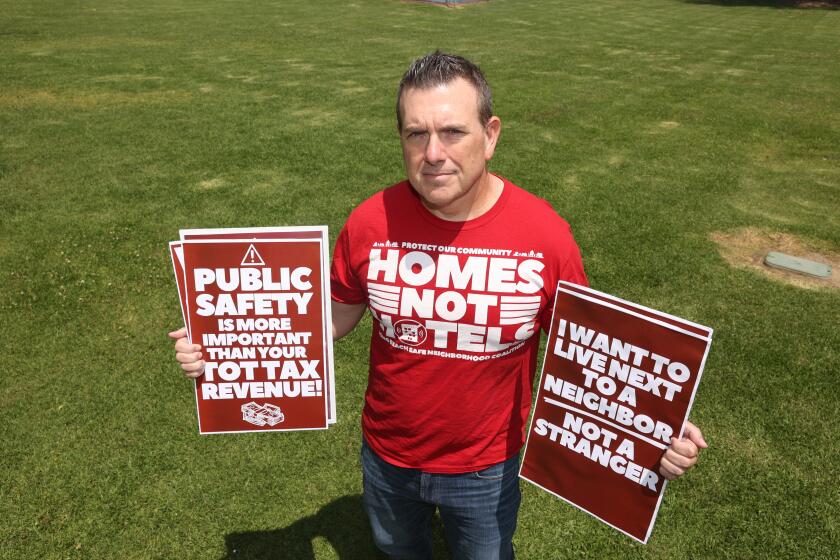Tenant Resents Unexpected Cost for Cable TV
QUESTION: The complex where I live has been wired for cable TV. The management sent out a memo informing us that cable would be available for an additional cost, and suggesting that tenants who wished to get good reception should order cable, because the antenna system currently in operation was to be discontinued.
I do not want to pay more money for TV, but now that the cable is in operation and the antenna is gone, my reception is lousy. Should management have to provide an antenna for my viewing pleasure or offer me cable at no extra charge?
ANSWER: The answer depends on the terms of your tenancy. If you are renting on a month-to-month basis, the management need only give you a one month’s notice that your service will be changed. Even though you may not care about the additional channels available on cable, as you may not care about a face lift to the exterior of your building, the cable is an improvement in the eyes of the owners and the expense may be passed on to the tenants. However, in rent-control areas, your owner’s rights to remove the antenna and install cable for an additional fee may be restricted. If you live in such an area, check with your local rent board.
If you have a lease, the situation is different. The terms of the lease, and the services provided under it, may not be changed without the agreement of both parties until the lease expires. When the management decided to install the cable and to disconnect the antenna, they should have compensated you for the change. The easiest way to accomplish this would be for the management to subsidize your cable service until your lease expires.
Tenant Feels Heat of Higher Utility Bills
Q: The gas heater in the house I rent broke and my landlord has decide to replace it with electric heaters for earthquake safety reasons. He assures me they will heat better than the old gas heater, but they are more expensive to operate than gas. Because I pay for the utilities, I was wondering if I could require the landlord to replace the old heater with a gas heater rather than electric ones.
A: Your landlord has a valid concern that an electric heater may be safer than a gas heater in an earthquake. You have a valid point regarding the increased expense. Even though the new heaters may end up costing you more money to operate, your landlord has the right to decide what type of heater he wants to use, as long as housing code standards are met.
Most rental agreements simply state that the tenant is responsible for utilities, with no guarantee regarding the cost of the utilities. Therefore, it would probably be difficult for you to show that the increased utility cost has changed the terms of your tenancy.
Discuss your concerns with your landlord; he may be willing to consider sharing the increased costs if he understands that the increase may force you to find another place to live.
Manager Slaps Ban on Motorcycles
Q: Can the manager of my building regulate the type of transportation I use? I ride a motorcycle to work because it’s the only transportation I can afford. Unfortunately the manager has just sent notices to all of the tenants, banning motorcycles from the property and threatening to evict anyone who disobeys the new rule. My motorcycle and I are both very quiet and we’ve never had any complaints.
A: You may find it helpful to approach the manager first and ask the reason for the ban. He may be reacting to a noise complaint or some other problem that could easily be corrected. If this is indeed the situation, the manager would be wise to handle the matter on a case by case basis, working with those tenants who may be causing the problem instead of penalizing motorcycle riders in general.
State law protects tenants from arbitrary discrimination, including a denial of their rights to reside on the property because of their ownership or use of a particular type of motor vehicle.
Tenant Held Liable for White-Fly Damage
Q: I rent a house with a large yard that I am responsible for maintaining. The landlord came over the other day and commented that some of the bushes in the yard did not look good, and that I should get a gardener to take care of them. I regularly water and fertilize all of the greenery around the yard, but the problem is with a white-fly infestation. I told my landlord that I sprayed several times with fly pesticide but that the problem is widespread throughout California and that the sales manager at the garden store said I probably could not get rid of the infestation totally.
My landlord responded by telling me that if the bushes are not in the same condition when I move out as they were when I moved in, he would deduct the replacement cost from my security deposit. Can he do this even if the damage has not been caused by my neglect?
A: No. Although you agreed to maintain the property as part of your rental agreement, and you have taken reasonable steps to try to alleviate the white-fly problem, it is unrealistic for your landlord to expect you to foresee and prevent occurrences not within your control. Just as a landlord cannot hold a tenant liable for the replacement of plants damaged by extremely cold weather, a landlord cannot hold a tenant liable for the cost of plants damaged by a statewide infestation of white flies.
However, to prevent problems at the end of your tenancy, it would be a good idea to try to get something in writing from a gardening expert discussing the widespread problem and the difficulty in controlling it; you also might save any articles written about the white-fly problem in California. Also, keep receipts from pesticide you used and photos or other evidence of your reasonable efforts to maintain the yard.
This column is prepared by Project Sentinel, a rental housing mediation service in Sunnyvale, Calif. Questions may be sent to 582-B Dunholme Way, Sunnyvale, Calif. 94305, but cannot be answered individually. For help in the Los Angeles area, call the Metro Harbor Fair Housing Council at (213) 539-6191 or the Westside Fair Housing Council at (213) 475-9671.






